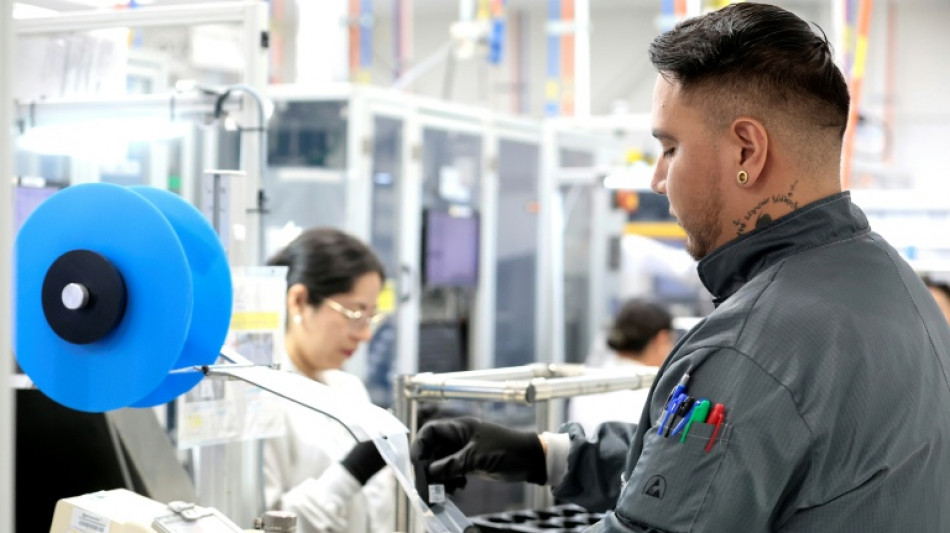
-
 Zimbabwe on top in first Test after Bangladesh out for 191
Zimbabwe on top in first Test after Bangladesh out for 191
-
De Bruyne 'surprised' over Man City exit

-
 Frail Pope Francis takes to popemobile to greet Easter crowd
Frail Pope Francis takes to popemobile to greet Easter crowd
-
Lewandowski injury confirmed in blow to Barca quadruple bid

-
 Russia and Ukraine accuse each other of breaching Easter truce
Russia and Ukraine accuse each other of breaching Easter truce
-
Zimbabwe bowl Bangladesh out for 191 in first Test in Sylhet

-
 Ukrainians voice scepticism on Easter truce
Ukrainians voice scepticism on Easter truce
-
Pope wishes 'Happy Easter' to faithful in appearance at St Peter's Square

-
 Sri Lanka police probe photo of Buddha tooth relic
Sri Lanka police probe photo of Buddha tooth relic
-
Home hero Wu wows Shanghai crowds by charging to China Open win

-
 Less Soviet, more inspiring: Kyrgyzstan seeks new anthem
Less Soviet, more inspiring: Kyrgyzstan seeks new anthem
-
Defending champion Kyren Wilson crashes out in first round of World Snooker Championship

-
 NASA's oldest active astronaut returns to Earth on 70th birthday
NASA's oldest active astronaut returns to Earth on 70th birthday
-
Exec linked to Bangkok building collapse arrested

-
 Zelensky says Russian attacks ongoing despite Putin's Easter truce
Zelensky says Russian attacks ongoing despite Putin's Easter truce
-
Vaibhav Suryavanshi: the 14-year-old whose IPL dream came true

-
 Six drowning deaths as huge waves hit Australian coast
Six drowning deaths as huge waves hit Australian coast
-
Ukrainian soldiers' lovers kept waiting as war drags on

-
 T'Wolves dominate Lakers, Nuggets edge Clippers as NBA playoffs start
T'Wolves dominate Lakers, Nuggets edge Clippers as NBA playoffs start
-
Taxes on super rich and tech giants stall under Trump

-
 Star Wars series 'Andor' back for final season
Star Wars series 'Andor' back for final season
-
Neighbours improvise first aid for wounded in besieged Sudan city

-
 Tariffs could lift Boeing and Airbus plane prices even higher
Tariffs could lift Boeing and Airbus plane prices even higher
-
Analysts warn US could be handing chip market to China

-
 Unbeaten Miami edge Columbus in front of big MLS crowd in Cleveland
Unbeaten Miami edge Columbus in front of big MLS crowd in Cleveland
-
Social media helps fuel growing 'sex tourism' in Japan

-
 'Pandora's box': alarm bells in Indonesia over rising military role
'Pandora's box': alarm bells in Indonesia over rising military role
-
Alaalatoa hails 'hustling hard' Brumbies for rare Super Rugby clean sheet

-
 Trio share lead at tight LA Championship
Trio share lead at tight LA Championship
-
Sampdoria fighting relegation disaster as old heroes ride into town

-
 Recovering pope expected to delight crowds at Easter Sunday mass
Recovering pope expected to delight crowds at Easter Sunday mass
-
Nuggets edge Clippers in NBA playoff overtime thriller, Knicks and Pacers win

-
 Force skipper clueless about extra-time rules in pulsating Super Rugby draw
Force skipper clueless about extra-time rules in pulsating Super Rugby draw
-
DEA MARIJUANA SCAM: As DEA Cannabis Program Implodes This 4/20, MMJ Stands Alone in Pursuit of Real Medicine

-
 Nuggets edge Clippers in NBA playoff overtime thriller, Pacers thump Bucks
Nuggets edge Clippers in NBA playoff overtime thriller, Pacers thump Bucks
-
Unbeaten Miami edge Columbus in front of big crowd in Cleveland

-
 Kim takes one-shot lead over Thomas, Novak at RBC Heritage
Kim takes one-shot lead over Thomas, Novak at RBC Heritage
-
Another round of anti-Trump protests hits US cities

-
 'So grateful' - Dodgers star Ohtani and wife welcome first child
'So grateful' - Dodgers star Ohtani and wife welcome first child
-
PSG maintain unbeaten Ligue 1 record, Marseille back up to second

-
 US, Iran report progress in nuclear talks, will meet again
US, Iran report progress in nuclear talks, will meet again
-
US Supreme Court intervenes to block Trump deportations

-
 Hamas armed wing says fate of US-Israeli captive unknown
Hamas armed wing says fate of US-Israeli captive unknown
-
Pacers thump Bucks to open NBA playoffs

-
 Sabalenka reaches Stuttgart semis as Ostapenko extends Swiatek mastery
Sabalenka reaches Stuttgart semis as Ostapenko extends Swiatek mastery
-
Zelensky says Ukraine will observe Putin's Easter truce but claims violations

-
 'Fuming' Watkins fires Villa in bid to prove Emery wrong
'Fuming' Watkins fires Villa in bid to prove Emery wrong
-
DR Congo boat fire toll revised down to 33

-
 England thrash Scotland to set up France Grand Slam showdown
England thrash Scotland to set up France Grand Slam showdown
-
Verstappen's Red Bull 'comes alive' to claim record pole in Jeddah


Trump auto tariffs strike at heart of North American trade
US President Donald Trump's tariffs on imported cars strike at the heart of a North American free trade agreement, threatening to disrupt supply chains and raise prices, experts say.
Thanks to the United States-Mexico-Canada Agreement that came into effect in 2020 -- and its predecessor NAFTA -- the region became an assembly line spanning the three countries.
"We've been making this supply chain more sophisticated for 30 years," said Juan Francisco Torres Landa, a partner at business consulting firm Hogan Lovells in Mexico.
"There is regional integration based on inputs, raw materials, and processes in all three countries," he told AFP.
Trump said the tariffs were in response to America's trade partners "taking our jobs, taking our wealth," but the duties promise to be a headache due to the deep integration of production chains.
Here are some of the expected impacts of the tariffs, according to experts.
- Snarled supply chains -
During the assembly of a car or truck, parts often cross the borders of the three countries multiple times before the vehicle is finished.
Extensive supply chains have been built involving hundreds of suppliers from different countries.
A car key alone can have more than 50 components from 22 different suppliers in Asia, North America and Europe.
The White House said vehicles assembled in Mexico and Canada could qualify for lower tariffs under the USMCA deal depending on how many of their components are made in the United States.
"Given the complexity of regional supply chains -- where parts often cross borders multiple times -- verifying compliance may require time-consuming adjustments, increasing operational costs," the political risk consultancy firm EMPRA told clients.
"US automakers with production in Mexico could face rising costs and logistical complications, which may lead some to reassess their manufacturing strategies," it added.
- Growth constrained -
Mexico's economy is considered one of the most vulnerable to Trump's planned tariffs due to its close trade relations with the United States.
The Latin American nation is home to many foreign-owned vehicle plants operated by companies including Ford, General Motors, BMW, Volkswagen and Toyota.
More than 80 percent of Mexican exports go to the United States, including around three million vehicles a year.
The auto tariff announcement comes at a difficult time for Mexico's economy, the second largest in Latin America.
Experts surveyed monthly by the Mexican central bank expect economic growth of only 0.81 percent in 2025, worse than the 1.0 percent they predicted in February.
The trade tensions "generate uncertainty and affect private investment and production decisions in key export sectors," Geronimo Ugarte, chief economist at the financial firm Valmex, told AFP.
- Trade deal in limbo -
Mexico and Canada consider Trump's tariffs to be in violation of the USMCA.
Mexican President Claudia Sheinbaum said Thursday "there should be no tariffs" between Mexico, the United States and Canada as "that is the essence of the trade agreement."
Washington's announcements have left the agreement in limbo.
"We need to analyze whether... for Trump, the USMCA should be replaced, substituted or simply extinguished by starvation," Torres Landa said.
Although a review of the treaty is due by 2026, Jesus Carrillo, an expert at the Mexican Institute for Competitiveness, believes trade policy "is being negotiated directly and progressively between governments."
"We're moving from having a treaty to having deals," Carrillo said.
He believes that "the USMCA will remain in effect, but with Band-Aids."
- More expensive cars -
Analysts and US trading partners warn that the tariffs will raise prices for American consumers.
Philippe Waechter, chief economist at Ostrum Asset Management in Paris, thinks the price of a car could increase by $3,000.
There is a risk that consumers will buy fewer new cars, according to the British-based consultancy firm Capital Economics.
"Assuming that domestic producers respond by substantially increasing their own prices, (the tariffs) could make new vehicles something of a luxury item," it said.
T.Ward--AMWN